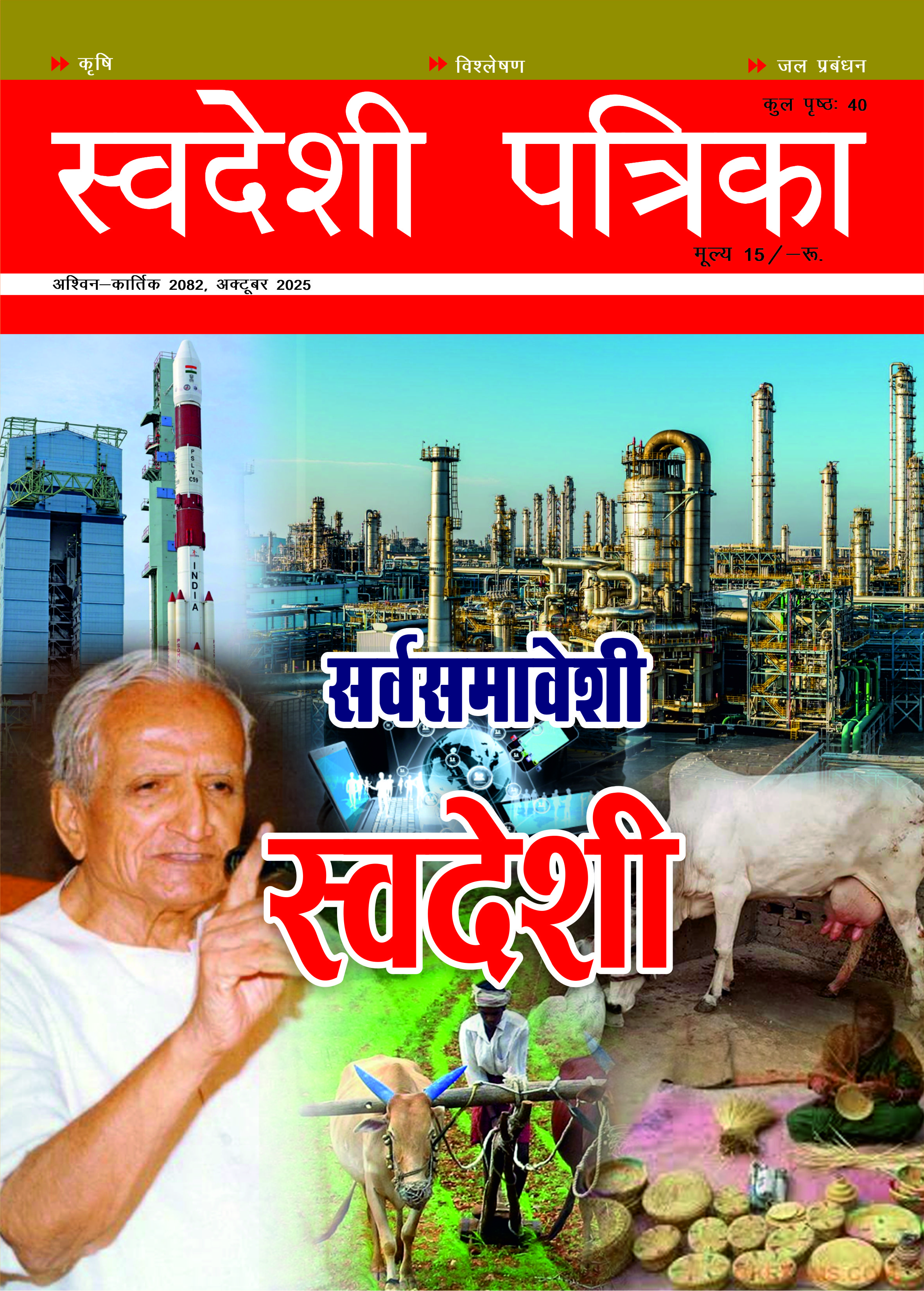
Census, if equated with caste census is destructive
(A cause for division and conflict among castes and sub-castes)
The census is not merely a statistical exercise, but a profound reflection of a nation’s social and economic health. It is both a mirror and a map—revealing where we stand and guiding where we must go. — Mahadevyya Karadalli
Preface: A census forms the cornerstone of people-centric governance and welfare-oriented planning. It provides the empirical foundation upon which national policies are framed, enabling the government to assess population trends, socio-economic conditions, and developmental needs. Far beyond being a mere enumeration of people, the census reflects the living realities of citizens and serves as a vital instrument for inclusive progress.
The Purpose of the Census: Equality of Opportunities, Not Outcomes
The fundamental objective of any census is “to ensure equality of opportunities”, not equality of outcomes. While equality of outcomes remains an unattainable ideal, history demonstrates that equal opportunities can indeed be achieved through thoughtful governance and social reform.
Over centuries, caste and sub-caste divisions overshadowed the philosophical intent of varna, causing deep societal fissures. The British administration, supported by colonial academicians, institutionalized these divisions for political gains. Tragically, post-independence India inherited and perpetuated this divisive framework, expanding caste classifications under the banner of “social justice or secular “ In the process, the spirit of “Dharmic equality” was sidelined by political expediency.
Post-Independence Continuation of Colonial Thought
After 1947, India’s intellectual and political leadership failed to evolve an indigenous understanding of its own social fabric. Influenced by Marxist and Western academic paradigms, scholars continued to view Indian society through the “oppressor–oppressed” lens.
The Political Use and Misuse of Caste Census
The idea of a caste census was first championed by the Indian National Congress, ostensibly to promote social equity but effectively serving as a strategy to fragment its political opposition. By dividing larger caste blocs into sub-castes, it sought to consolidate electoral influence. Even today, some state governments those are ruled by Congress party continue this divisive agenda under the guise of “surveys” rather than censuses—most notably Karnataka, which has expended enormous public funds and manpower on a politically motivated caste survey lacking transparency and scientific rigour.
Equal Opportunities: The True Path to Social Justice
True social justice does not emerge from categorizing citizens into ever-narrower identities but from enabling every individual—irrespective of caste or creed—to access education, healthcare, and economic opportunity. By addressing “economic deprivation” and “lack of access” other than caste identity, the state can correct historical imbalances without reinforcing social barriers. Well-designed economic programs, based on accurate data, can uplift the disadvantaged while preserving social cohesion and cultural integrity.
Objectives and Significance of the Census
The census serves multiple vital objectives for a modern state:
- Population Analysis: To determine the total population, density, and growth rate.
- Demographic Profiling: To analyze age, gender, education, occupation, and economic conditions for effective policy formulation.
- Regional Planning: To identify disparities between rural and urban areas and assess the availability of civic amenities.
- Service Delivery: To guide planning for essential services such as healthcare, education, nutrition, housing, water, and electricity.
- Administrative Utility: To serve as a factual basis for delimitation of constituencies, allocation of government funds, and creation of employment opportunities.
Applications Across Key Sectors
- Education: Census data inform policies on school–student ratios, teacher recruitment, and educational infrastructure planning.
- Healthcare: It aids in analyzing birth and death rates, determining the distribution of various medical services through agencies, professionals, and planning healthcare facilities across regions.
- Economic Planning: Data on workforce participation, unemployment, and skill levels help shape industrial and employment policies for sustainable growth. Further Census Data provides valuable insights for students and skilled workers about the availability of employment opportunities and the sector which is facing shortages. It serves as a guiding indicator, helping the students to decide which subject or skills they should learn while pursuing their graduate and prost-graduate studies. It also shows direction to choose research avenues after completing of their education.
- Social Welfare: Insights provided Census figures guide targeted welfare schemes for women, children, the elderly, and economically weaker sections, ensuring inclusive development.
Census and People-Centric Development
Accurate census data helps to frame people-centric and welfare-oriented schemes, including Ayushman Bharat, Anganwadi, Public and Government Schools, and Rural Development Projects. Urban planning relies on population density and housing data to design roads, drainage systems, and civic infrastructure. In rural regions, information on agricultural labor, irrigation, and women’s participation guides investment and development programs. In essence, the census is the heartbeat of effective governance, a prerequisite for data-driven policy and equitable growth.
Conclusion
When we observe the system and methodology of conducting ongoing caste census or surveys in Karnataka, it becomes clear that the Central Government must take precautions and undertake thorough preparations for ensuring voluntarily participation by public in the forthcoming all India level census. Citizens should be made aware of the importance and distinction between Census and a Caste Census. A well-structured and essential questionnaire must be prepared for the Census.
To avoid misunderstanding and socio-political controversies regarding Census, discussion, consultation can be conducted with Experts and Scholars having nationalistic thoughts and having concern for country unity and integrity.
A suggestion for the consideration of Union Government. Irrespective Caste, Religon, Sect or community Nationality shall be Bharatiya. As those residing in America are Americans, Japan are Japanese, France French, China Chinese like wise the people born in Bharat and the People have permanently settled with genuine Aadhar Card, Pan Card, Voter ID their nationalist by default is Bharatiya. It shall be automatically recorded as Bharatiya by default in the nationality Column.
There shall be provision for 4 does. First code shall be based on their faith or mode of worship Viz Hindu, Muslim, Christian etc. One unique code be assigned. Secondly a separate codes for caste Thirdly code for sub caste & sub groups within communities and Fourth Code for others. Within these main codes there may be sub codes viz a, b, c, d, etc with provision to mention their sub caste.
People should be encouraged to participate voluntarily in Census. Teachers and other government employees involved in the census process should be given proper technical training. The cooperation of local bodies must also be ensured.
Overall, the Central Government as incase of voter awareness campaign shall undertakes awareness initiatives at various levels and dimensions to educate both enumerators and the general public about the significance of the census. Then only one can gather accurate and reliable data. That data can be used effectively in coming years for People-Centric Development. Every citizen’s participation in this process is an act of national responsibility. Yet, censuses must remain constructive, not divisive. When reduced to a tool for political mobilization or caste-based fragmentation, they endanger the unity and integrity of the nation.
Now a days for political reasons and reservations Census is like a knife that is sharp on both edges i.e. sensational and sensitive. The Central Government must ensure that censuses are conducted scientifically, transparently, and purposefully—free from political influence. A line of caution to State governments, especially Karnataka where Census cum survey is going to end. It should refrain from publishing flawed caste-based surveys masquerading as economic assessments.
In the final analysis, As Census is the Heart of Welfare and People-Centric Planning it shall be handled with care. Census must serve as an instrument of national integration, not division. The census is not merely a statistical exercise, but a profound reflection of a nation’s social and economic health. It is both a mirror and a map—revealing where we stand and guiding where we must go.
It should strengthen the bonds of unity, foster equality of opportunity, and enable Bharat’s continued march toward holistic and inclusive development for Smrudda and Sashakta Bharat.


